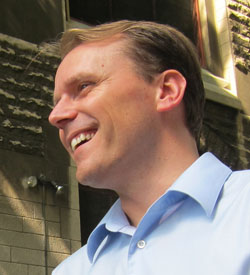Spreading Pluralism's Gospel
TC student and Unitarian Universalist minister Nathan Walker argues for public policy that reflects multiple perspectives -- including religious ones
Six days a week, Nathan Walker busies himself minister of the First Unitarian Universalist Church of Philadelphia. But every Tuesday morning finds Walker on the early bus to New York for a long day at Teachers College.
“I call it a date with my dissertation,” says Walker, who is finishing an interdisciplinary doctorate in Law, Education and Religion. It won’t be his first TC degree: he earned an M.A. in 2002 and an M.Ed. in 2008 in higher education. In between, he received his Master of Divinity in 2005 at Union Theological Seminary.
Some might call it a double life, but for Walker it all comes together in the book he has somehow found time to edit, Whose God Rules? Is the United States a Secular Nation or a Theolegal Democracy?, out this month with Palgrave Macmillan. It features essays by noted scholars such as law professor Alan Dershowitz and philosopher Martha Nussbaum. Former British Prime Minister Tony Blair wrote the foreword.
Remarkably, the authors contributed on the strength of a cold call: an email from Walker describing a theory he developed in a sermon, and asking if they’d care to weigh in.
The sermon was titled, “Theolegal democracy: How theology is used to make laws in the United States.” Walker coined the term “theolegal” to distinguish the United States from, on the one hand, secular democracies like France, where laws enforce freedom from religion, and, on the other, theocracies, where one religion determines law.
“Most people can agree that we are a highly religious society,” Walker says. But the American blend of religion and law raises issues like the one his dissertation explores: whether public school teachers should be able to wear religious garb, such as a cross, yarmulke or hijab, in the classroom.
The American debate over same-sex marriage is also uniquely framed, Walker says. “If we saw ourselves as a purely secular society, we would not be using religious rationales to define marriage as being between one man and one woman.”
Yet it’s precisely because different religious groups do weigh in on these issues that several American states now have marriage equality.
“It takes alternate religious perspectives to counter that, which has led to marriage equality in several states,” Walker says. “The Unitarian Universalists in Massachusetts were at the forefront of that debate along with other liberal religious groups, ensuring that one person’s God is not ruling all,” he says. “In a theolegal democracy, you need alternate religious voices in order to maintain neutrality.”
In Whose God Rules?, co-edited with Edwin J. Greenlee, scholars – including conservatives -- amplify and, in some cases, critique Walker’s theory. Which is just what he intended.
“The goal was to spark a debate,” he says. Indeed, with both the book and his doctoral research, Walker hopes to contribute to public policy that advances pluralism in America. But he says the most profound payoff from his academic work comes everyday with his congregation in Philadelphia.
“At its core my TC experience has taught me to help make meaning of our lives,” Walker says. “And that’s what I do on a daily basis as a minister.”
Published Wednesday, Dec. 21, 2011
